Anatomy of an Era: Ed Stewart, Part 3
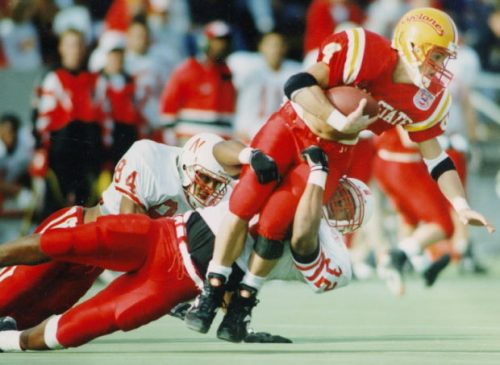
Excerpted from Chapter 75, No Place Like Nebraska: Anatomy of an Era, Vol. 2 by Paul Koch
Anatomy of an Era: Ed Stewart, Part 3
Q: Speaking of the linebacking corps, tell me about Coach Kevin Steele. Fill me in on the guy…
ES: Intense. In-tense. Was an excellent coach as far as excellent teacher and strategist about what we were supposed to do. I think that he and Coach McBride were phenomenal in that regard. I talk to people today who know Charlie or talk about Charlie and coached with him, and they talk about the subtlety of a tweak that Charlie would make at halftime, just reposition in alignment by a yard, and that put you in that much better a position to make a play.
Just the preparation going into games, there were never a lot of surprises by what the opposing team would do. What we practiced was what we saw come game time. With Tony and Coach McBride and Coach Darlington and Kevin, their preparation and teaching and coaching and preparing us for the games were great, but Kevin was an intense guy and we had a lot of fun and it was a great experience.
Q: And I’d be remiss if I didn’t bring up the day everybody walked in wearing the t-shirts saying, “Hey, my name is Ed, too.” (laughs)
ES: (laughing) They told you about that, huh?
Q: I remember that! I remember a bunch of guys walking into the weightroom wearing those t-shirts and thinking, ‘What the heck’s all this about?’ And history already tells the story of the switch you had to make and your not wanting to make it, right?
ES: Yeah, I went kicking and screaming to say the least. That’s a funny story. It’s one thing when you’re a hundred an eighty-five pounds at the end of spring practice and they say, “We’re going to move you to linebacker” and the last couple of days practice you’re in your shorts and helmet and then you go out there in a game and fly around and make a bunch of tackles, and that’s great. Then you come back to fall practice and you start having to do the things linebackers have to do on a daily basis, (laughs) and you’re like, ‘Hey, no. This ain’t gonna work!’ (laughs)
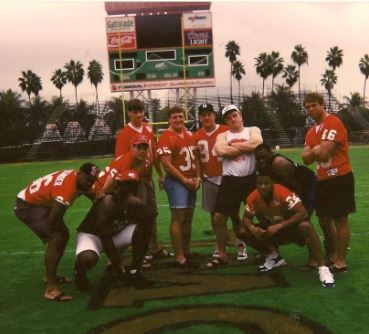
The linebacking corps in Miami
Q: You ended up 30-40 pounds heavier, no?
ES: Yeah, about that. I think I came into Lincoln at about 180-185 pounds and ended up walking out of there at right around 220.
Q: And Ed, I want to ask you if you think Kenny Walker had any effect on you guys going forward?
ES: I don’t really know. I don’t think we ever looked at Kenny as having any kind of disability. But the way he conducted himself and handled his business, just watching him and Pat Tyrance, how much better guys can you get than those two guys?
Q: Exactly. I always thought maybe you’re on second or third string getting walloped every day and maybe you feel like you should be a first or second-stringer, and then you look over and see Mimi Mann and Kenny and all the issues they’re dealing with there and maybe you say to yourself, “Hey, what am I bitching about? He’s missing a tool and look what he’s able to accomplish. I shouldn’t be bitching about anything but my own effort.”
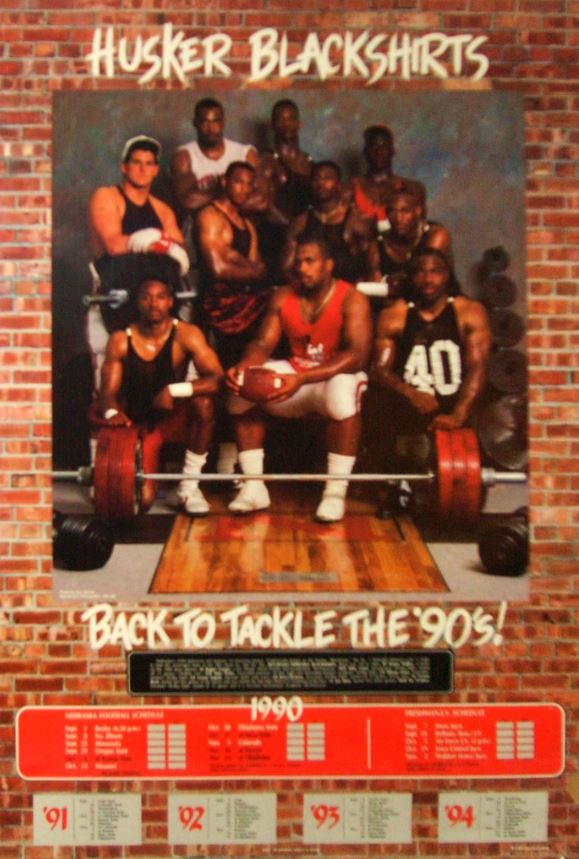
ES: I think more than anything it probably speaks to the level of patience and commitment of Coach Osborne and the coaches to work with Kenny. Because there’s a ton of people out there -and I think Kenny probably could have had a longer NFL career- but there’s people out there who don’t wish to deal with it because it’s more work for them, so I think it speaks to the quality and depth of the coaches and people around our program because they were willing to invest the time and make the necessary -I don’t want to say ‘concessions’- but to make the necessary efforts for Kenny to be successful.
Q: Interesting take. Well hey, I’m almost done here, but I have to ask if you have any good off-field incidents worth sharing?
ES: First I’ve got to know if anyone’s thrown me under the bus. (laughs) There’s so many great memories. Kareem Moss and I were roommates for a long time, Willis Brown and Clester Johson, Tommie Frazier and Tyrone Williams and Barron. I don’t know if you’ve ever had a better corner combination than those guys, lots of really good guys. Really good memories, it’s just good to go down memory lane and think about some of that stuff and relive some of those moments.
Q: So what did Tommie bring to the team?
ES: I remember Tommie, it was the game in ’92 at Washington. It was a competitive game and I think we were down 3 or seven points and Mike Grant was hurt and we were backed up at our own 10 yard line and thinking, ‘Oh crap, we’re in this situation playing a true freshman.’ And Tommie played like a stalwart. And I remember thinking, ‘You know what, this guy might be okay.’ I used to joke with him and call him ‘The Trash Man.’ (laughs) Tommie wasn’t always the most graceful runner, but he was effective and you couldn’t bring him down. I used to give him a hard time all the time.
Q: Did he have a unique attitude or mindset?
ES: Tommie was a winner. He was a winner, now. And as a young guy, I remember my senior year -and this was something a senior would go and say to a young guy, but I remember Tommie- and the first couple games of the year I was getting four or five tackles and I didn’t get off to a blazing start in those first couple games- and I remember Tommie walking up to me and -one thing, a quarterback?- (laughs) and kind of calling me on the carpet and saying, “I’ve been looking at the stats and what’s this? You only had five tackles?” And I’m looking at him and thinking, ‘A freaking quarterback giving me hell?!’ But that was the type of leadership that he had, even as an underclassman, was to be confident enough and comfortable enough to walk up to a starting guy to kind of say, “Hey, what’s up, man?” He and I have joked about it since then, but it was a good, little, extra spark. (laughs) I think I went off and rattled off a few ten tackle games after that.
Q: Anything to shut him up, huh?
ES: That’s it. (laughs) Because you know about those Florida guys… they like to talk, now.
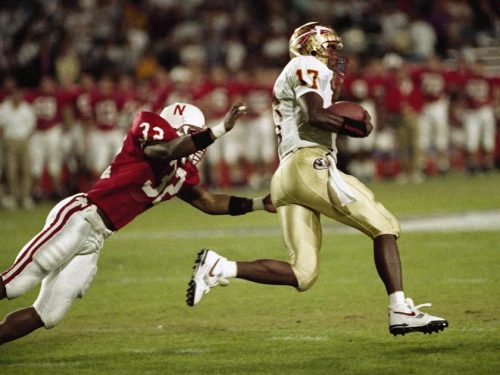
Q: Speaking of: with Florida and Miami and Florida State, there was a lot of jabbering going on, no?
ES: Lots of it. There’s a funny story I tell people all the time, and we’re playing Florida State in ’93. I’ll never forget, man, in the beginning of the game they’re getting in the I-formation and they go to the shotgun, and fullback William Floyd is standing there and I’m bluffing my blitz and moving around, and at the beginning of the game William Floyd yells out, “Come on, Stewart! I know you’re coming! I’m ready for you, you mother-effer!” And I remember looking at him and looking around and saying,‘This guy is fired up to block?!’ (laughs)
Q: You knew it was going to be a long night and a good fight, huh?
ES: Well, I knew we were going to have some collisions. We had a lot of fun. There was going to be no quit in either one of us, and we had a few head-on collisions that night.
Q: If I’m lucky, Ed, I’d like to get ahold of a guy or two from those teams: Florida State, Florida, Miami, and hear what they have to say about you guys.
ES: That would be interesting. I actually saw William Floyd the year Nebraska was in the Gator Bowl and he was up there, and we saw each other. It was like two long-lost cousins running into each other. It was good to see him. I thought Cory Schlesinger liked to block, but I never saw anybody profess it quite like William Floyd did that night. (laughs)
Q: Would that be one of your favorite games?
ES: This may be a little selfish -and all the bowl games were great games because you got to play with them- but those teams started to spread it around… and I’m an old linebacker and I just wanted to line up and, ‘Let’s play some smash-mouth football and hit each other in the mouth.’ But the opportunity to play in two national championship games is irreplaceable.
Some of my fondest memories were just the bus rides to the stadium over there in Lincoln, just riding the bus over and seeing all these people in red in the streets. And then you get out into the stadium and you start warming up: it’s about 20 to 30 percent full, and you go into that lockerroom for one last time. And then you come back out and that place is just a Sea of Red. Some pretty special memories right there.
Q: Makes the hair stand up on the back of your neck a little?
ES: Not a little bit, a lot of bit. It was good stuff.
Q: And you never did say, do you have a favorite game that was a non-championship game?
ES: I don’t know. I just loved to play the game and wherever we were going to play it against whomever. I just wanted to go out and play football and hit people… and try to hit them as humanly hard as possible.
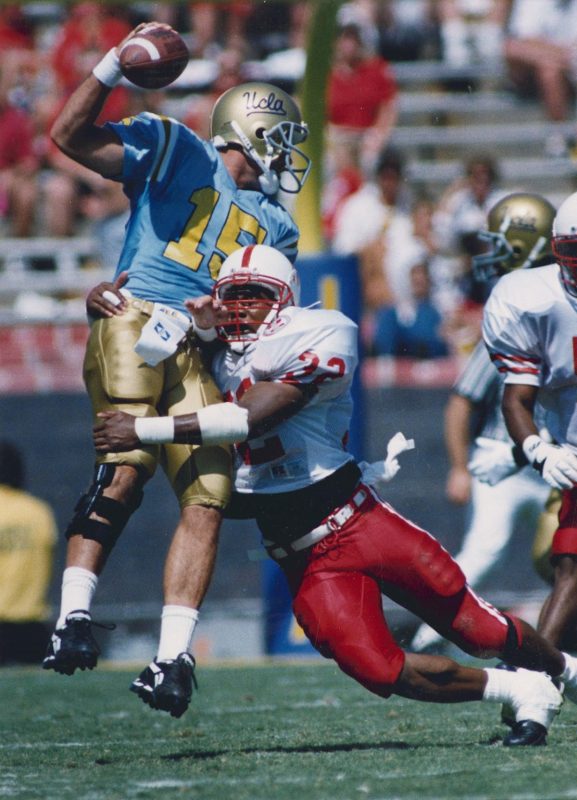
Q: That sounds like a linebacker, Ed, not a defensive back. (laughs) So from your freshman to your senior year, what are probably the most profound lessons you learned there at Nebraska? Any surprises? Epiphanies?
ES: To me, college football -and I’m working on a little book myself that I’ve been working on for a while- but to me athletics is such a platform for life in so many ways. It’s about work ethic, about loyalty, about how to treat people, about overcoming adversity, about being a good partner, good teamwork.
I don’t know if you remember, but my senior year I was diagnosed with a kidney condition. And I didn’t even know if I was even going to play, but I just remember the linebackers, the guys, coming up into the hospital that day to see me. It just really drove that point home about togetherness, being your brother’s keeper, the whole team unity aspect of it, and then to overcome adversity. There’s lots of highs, there’s lots of lows. Going a long ways away from home and getting acclimated to a new environment that was very different from the one you just left, so I really grew up and became a man through that entire experience.
Q: And to this day, what is the greatest lesson or the thing you most often apply in daily life?
ES: I think my own professional career -my wife says I’m a completely different animal at home- but I think there’s a large part of Coach Osborne that’s rubbed off on me as far as a level of calm that I think I have about me when I’m dealing with different issues and having to make tough decisions; just a level where I’m able to stay pretty even-keeled about things. You don’t get a lot of highs and lows from me; I try to stay pretty even-keeled and pretty in-the-moment, try to be as observant and aware of all the facts that are in play and come into account when I’ve got to make decisions.
I think it’s important for me -something that I learned- is to treat people -everybody- well. Whether it’s the janitor who’s sweeping the floor of the building you’re leaving to the most highest level donor or executive you encounter, everybody should be afforded the same level of respect and appreciation and they should have an opportunity to feel vested and valued.
Q: That’s awesome, Ed. So what is your position with the Big 12 Conference front office?
ES: I’m the Assistant Commissioner for Football and Student Services.
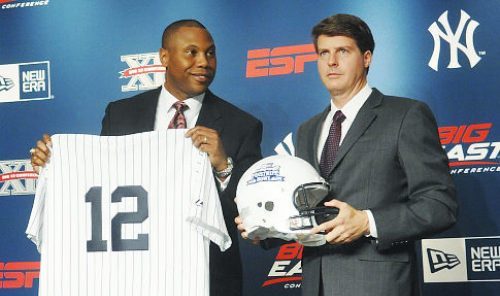
Q: So you’re wearing many hats. Is there one specific detail where you focus most of your attention?
ES: Really, it’s two-fold. Everything that has to do with the business of football for the conference, from bowls and television to game operations and those issues. And then the student-perspective so the student-athlete can have as full and enriching of a collegiate athletic experience that I and several of my teammates were afforded. So, hopefully, we’ve got a lot of kids who are walking away with some valuable life-lessons and experiences and developments, some platforms to go on and lead in a much grander and much more important scale than what we did during the time, and hopefully they’re doing that during their time as a student-athlete, too.
Q: So are you in charge of pushing a position, of trying encouraging some institutions to make changes? Or is it a regulatory, mandated thing?
ES: Well, it becomes regulatory to an extent. Our membership has come together and has established a set of rules, a set of bylaws our conference was founded upon. And within each respective sport there is a complete list of policies or conference agreements that have been produced and are in place. So the conference office’s role has to kind of serve as a governor, if you will, to monitor all of that. And you’ve got involvement with bowl games and the BCS and all that stuff from a national level with the NCAA and football-playing rules, so it’s pretty much all-encompassing.
Q: So you try to hold people accountable and make sure they live up to their promises, huh?
ES: (laughs) You just try to stay out of their way. You try not to screw it up.
Q: Have your Nebraska roots had any negative or positive influences on you doing your job?
ES: I think it’s good having a familiarity with the league and some history with the league. Whether it’s real or perceived, I think many of us who have worked or played at an institution always kind of subconsciously think that to a degree, and you’re hoping the people aren’t thinking that you’re favoring -whether it is Nebraska or Missouri because of my time there- so really it’s hard to do.
And the one thing at I’ve learned -and it’s become very hard to do- you have to be very neutral and very fact-oriented. People talk about calls in a game -officiating calls and things going different ways- but I’ve found a lot of times most fans and most people who have a vested interest in a program, whatever program it is, have a pretty hard time looking at the facts objectively. They’re always going to be skewed to their interests and their passions. And I think one of the unique things about conference work -and it’s a positive thing- you really have to remove yourself and kind of take the mountaintop view and look down at something and be removed from the emotions of the moment and look at the facts of the moment and what’s right and what’s wrong, what’s the best interest for the conference, what’s in the best interest nationally versus what’s in the best interests of a specific entity at one point in time.

Available on Amazon.com
Q: Well, Ed, you’ve given me over an hour of your time and I’ve appreciated it. Any last comments we haven’t touched upon in defining the success the team had on their championship runs?
ES: I’d just say a thank you, Paul, for doing this and investing your time. I’m sure it’s been great for you to talk to a lot of guys and get a lot of stories, but at the same time it’s a lot of work and commitment on your part and you’re away from your family.
I’d just express appreciation to all the people that impacted my time in Lincoln and to all the fans. One of the greatest memories I have is going back on a plane, going back to a game when I landed there in Omaha -and this is less than five years ago- and I remember being in the airport in baggage claim and this random guy who may have been five or ten years older than me, he says, “You’re Ed Stewart.” And I said, ‘Yes?’, and he said, “I always appreciated how hard you played and how you represented the program.” And I’ve told that story to the younger folks, that that is really the ultimate compliment a person can get, being so far removed after the fact, that somebody had a respect and appreciation not only for what you did but for the way you did it. And you don’t realize it at the time when you’re doing it, but that’s the type of legacy that you hope to have left behind. I’m just very appreciative of all the folks like yourself and all the strength coaches and athletic trainers, taping me up all the time. There were so many folks that were supportive and encouraging.
End conversation.
Ed shared a number of appealing tidbits here, and none more so than his mention of creating a winning atmosphere at Missouri in relation to his experiences at Nebraska, “…you had to change some attitudes and mindsets and work habits.” Let’s take a look at the three and how Nebraska’s culture was cemented in his young mind:
Attitudes: “..walkons: they would bust their tails” & “We came in and kind of a had a focus and determination that we wanted to do some big things, and we wanted to perform at a high level..” (emphasis mine) It’s a bit difficult to separate the concept of Attitudes from Mindsets, but I believe the first thing that distinguishes an attitude is the aggressive nature of the thought process, which, in these examples, shows an attitude of relentless pursuit of the top rung. This rung could have been a personal goal or team-wide accomplishments, but the gist is that not only were ‘big things’ a dream, but they were a goal. It’s been said that the difference between a dream and a goal is a deadline. Many of these guys had a four year deadline. Some had five. The clock began ticking down the day they first set foot on campus, and they never forgot this fact.
Mindsets: Speaking of the waning minutes of a 22-0 loss to Miami in Miami: “We aren’t giving up the ghost. Never say die. Never go down easy. This is for posterity. This will be remembered, so make it count regardless the situation…” There was a sense of ‘fight’ in that huddle, where it was, “You know what? We might lose the game, but we’re not going out like that. We’re gonna play hard, we’re gonna try to smack somebody in the mouth, and we’re not going out like that.” Along with: “…it was just that: a team. We were all Nebraska. We were trying to get the N on our helmet and (were) representing the state.” A Mindset can best be described as a set of personal absolutes, lines drawn in the mental sand, with vows made to never allow those lines to be crossed. In representing something or someone other than, something grander than themselves, they were well aware of the fact that the team was performing on a national stage as ambassadors of a state and its populace, of a university willing to extend the privilege of its educational avenues, its growth mechanisms, its capacity to support their best interests and its built-in desire to extend its collective public endearment.
Work habits: Once again, “..we worked as hard as we did was because of so many of the walkons that we had…” and “…when you’re with any state institution it’s got to start by keeping the guys at home.” Also, “It’s about work ethic… about how to treat people, about overcoming adversity, about being a good partner, good teamwork.” So much of this rings true to me not because these quotes are from a former walk-on, but a scholarship player no less. It’s not a sexy topic, hard work, but I’m sure Ed harkened back to those winter conditioning sessions in the Cook Pavilion, those Monday-Tuesday-Thursday-Friday weight lifting shifts in West Stadium, those rounds of film study in South Stadium, and those summer bouts of running and competing in the passing league on Memorial Stadium’s metallurgical, sweltering smelting furnace. Boyd Epley said it earlier and said it best: “Champions are made when no one is watching.”
Notable quote #2:
Ed Stewart on recruiting: “…there weren’t any promises made other than, ‘We’ll take good care of your young man, he’ll get an education and have a tremendous opportunity to be a part of something special…’ ”
Copyright @ 2013 Thermopylae Press. All Rights Reserved.
Photo Credits : Unknown Original Sources/Updates Welcomed
Author assumes no responsibility for interviewee errors or misstatements of fact.